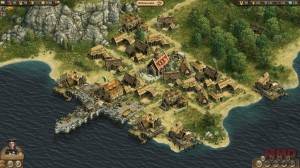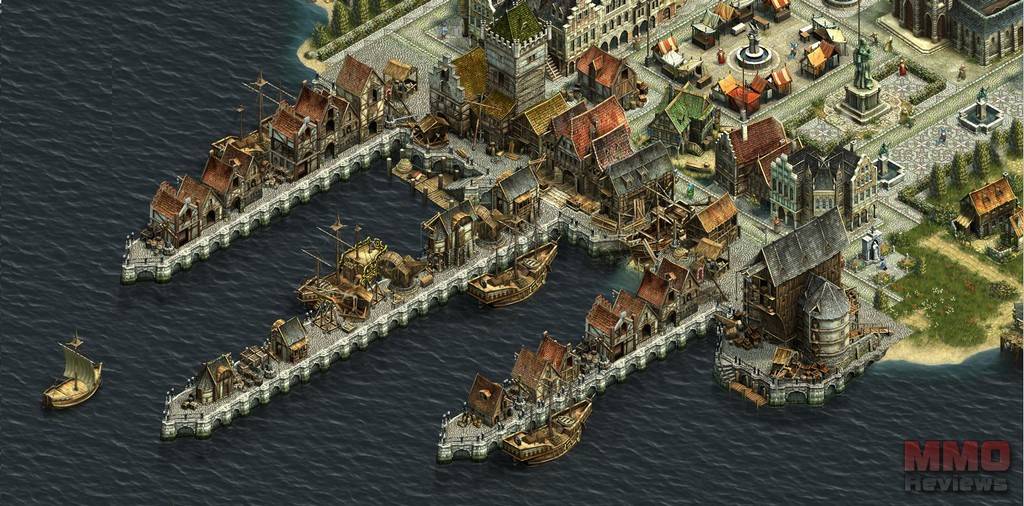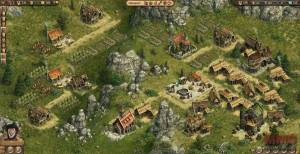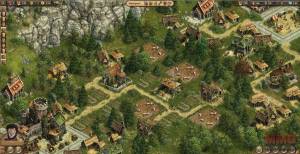RATINGS:
Graphics: 7
Gameplay: 7
Sound: 6
Overall: 7
Pros: Requires strategy in your city planning, highly customisable towns.
Cons: Perhaps too easy and a bit too casual for some gamers
Browser-based City-building MMOs aren’t precisely a brand-new thing, as the market is already full of games of this kind. However, things are likely to sound more interesting when an industry giant such as Ubisoft is offering their own interpretation of the genre by bringing an online instalment of the Anno series, which is one of the best and most appreciated off-line city-building game series, right to your browser: Anno Online.
The single player games task players with building and expanding their own fledgling empire. They start with a single undeveloped colony they have to make grow and prosper through diplomacy, trading and war, and will discover new lands and technologies in the process. The spirit of these games is what Anno Online tries to bring online, adapting it to the rather casual style of the browser game audience.
The major difference to the offline series is that 2 classic and essential aspects, namely combat and disasters, are completely missing. In line with this new, more casual style, Anno Online users will be a lot safer than before in, only being concerned with making the best use of their resources and keeping an eye on their finances and their citizens’ needs. This doesn’t mean, however, that Anno Online is a piece of cake, since strategic placement of roads and buildings is crucial in order to create the perfect city and avoid a waste of resources - but more on this later, for now, let’s start from the beginning.
The usually quick and simple registration process is possible via your Facebook/ Uplay/ G+ account and allows players to enter the game with a single click. They will be welcomed by a standard tutorial, consisting of a series of quests that will guide them through the game’s main systems and features and grant rewards upon completion. Quests are never intrusive and actually pretty useful, and we moreover didn’t have the feeling of being just being a button-clicking automaton as it is often the case in similar games. Even from the tutorial you will have to think where to build your buildings and your roads in order to make the best use of the available space. It’s indeed a good and interesting tutorial and not just a boring click-fest, which is something tremendously important, as it’s the first thing that players are confronted with in a game and most likely the aspect that makes they stay or leave. With Anno Online, we definitely think that Ubisoft succeeded.
Considering the fact that it’s a browser game, Anno Online’s graphics are amazingly good, with nicely detailed 2D images and simple sprites and, over time, your town will look more and more vibrant and real. The engine is quick and light and the navigation system is intuitive and comfortable. The UI fulfils its purpose and players get an idea of what a building is meant for just by hovering their mouse over the icon in the construction menu or clicking on it once it is placed.
When it comes to sounds, they’re average at best, and although the background tunes aren’t bad, hearing them over and over again could quickly become annoying. However, you have the option of disabling them and the problem is solved.
In regards to gameplay, Anno Online has many similarities with a lot of other strategy titles out there: you have to place resource buildings, gather resources, build more houses to increase your population and other useful buildings like a well and a market place, expand and repeat. The way in which Anno Online differs is that your town’s layout actually matters; buildings affect each other, increasing or decreasing productivity and population in their area of effect.
Furthermore, the presence of a specific building in the nearby vicinity is often required in order to place another building. Aother feature we appreciated a lot is the ability to freely move your buildings around even after they’re placed, which allows for experimenting new layouts or just changing the town’s appearance. Roads are important as well, as most of buildings have to be connected with each other in order to allow the population to move around and carry resources and goods. And it’s totally up to the player to determine every single turn or straight path on their own. This high level of customisation is not only important from a purely tactical point of view, but will also make all those who love to build the town of their dreams and actually care about aesthetics as well pretty happy.
As their town grows, new types of citizens, such as vassals, will arrive, allowing players to explore additional areas of the map and expand their territory, eventually reaching new islands.
Anno Online features a premium currency in form of Rubies which can be purchased with real money, rubies and will help players to have an easier time by granting access to resources, buildings and more. However, from what we were able to see, it’s totally possible to enjoy the game without paying a single cent.
Conclusion
Anno Online is a very casual and relaxing city-building experience, perhaps too casual for certain people. The elimination of some of the series’ classic elements, such as combat and disasters, possibly lowered the difficulty a bit too much and could deter some of the hardcore fans of the saga. However, this is certainly seen as a strong point by the rather casual audience, which Anno Online seems to be targeting. Those who look for a competitive and challenging real-time strategy title should probably look somewhere else. For those who want to enjoy a nice and simple yet still polished and rewarding city-building game, where the strategy lies in resources and income/ outcome managing as well as city map planning, Anno Online might be a pleasant surprise.








Deja tu comentario
You must be logged in to post a comment.